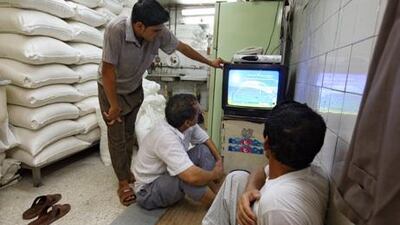The UAE will switch off its analogue television broadcasts by 2013, opening the door for digital TV stations and high-techservices such as mobile video on demand.
Frequencies now used for analogue terrestrial stations will be used for a fourth-generation mobile network.
Digital terrestrial TV (DTT) channels will be launched in place of the analogue stations.
The new channels, which will be similar to Freeview digital stations in the UK, will require an aerial and decoder box to receive a signal. Other services could include pay per view and mobile video on demand.
"The UAE switchover from analogue to digital broadcasting will be accomplished by 2013," said Mohamed al Ghanim, the director general of the Telecommunications Regulatory Authority (TRA).
"Digital broadcasting has a great number of potential benefits including quality, efficiency, mobility and the ability to provide a better multimedia transmission."
Mr al Ghanim said the TRA would examine licensing DTT channels.
"It will lead to the launch of digital terrestrial television," he said. "Once we migrate, we will look into a licensing model. It's going to be much more than the analogue channels. It's going to open huge opportunities for operators, content and mobility."
Digital TV is already available in the UAE through satellite and internet protocol television (IPTV) services offered by the local telecommunications operators Etisalat and du.
But a handful of local terrestrial stations still broadcast analogue signals.
Terrestrial TV is not widely watched in the UAE. A recent study by the consultancy Arab Advisors Group found there were just 138 terrestrial TV stations broadcasting across 19 Arab countries, including the UAE, Saudi Arabia and Kuwait. More than half of those are broadcast in Palestine, Iraq and Egypt.
Jawad Abbassi, the founder and general manager of Arab Advisors, said the switch to a digital signal would be useful in freeing up signal capacity. But industry observers said the dominance of satellite TV in the UAE meant commercial opportunities around digital terrestrial stations were uncertain.
Nick Grande, the managing director of Channel Sculptor, a television consultancy in Dubai, called satellite TV "ubiquitous".
"You've got almost 100 per cent satellite penetration," Mr Grande said. "Would there be the same level of demand [for DTT stations]? I doubt it."
But he said there could be a market for DTT in remote areas.
"Having an alternative is always a good thing," Mr Grande said. "If it's cheap to get and easy to install, why not? These services will appeal to people in more remote areas where they don't have broadband.
"I'd imagine that there will be a bouquet of public service channels or domestic channels. [Some current terrestrial] broadcasters would probably be gifted a number of channels each as part of this process."
Another issue is regulation. At present, satellite television stations are not regulated or controlled by the Government, unlike terrestrial channels and IPTV stations.
"For the regulator, DTT is very attractive because it means broadcasters have to follow their rules," said Mr Grande.

